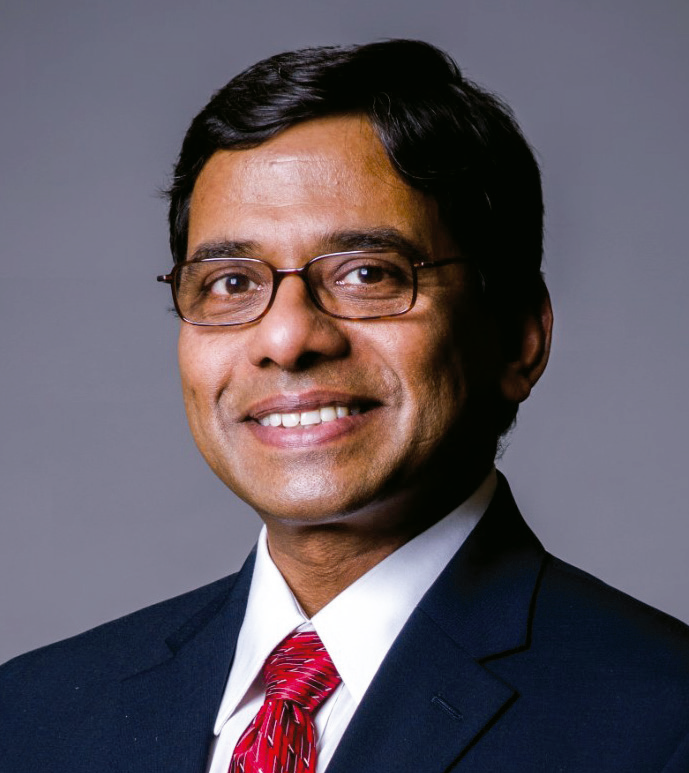Tech entrepreneur and educator
Rajesh Nair

“Most adults build this wall, which protects them from making mistakes, but that’s the only way to learn,’ says Rajesh Nair, founder of EnCube Labs. ‘If you leave a baby on the floor, she’s going to move around ... she has no concept of wrong, because if you need to learn, you need to try things.” Rajesh Nair has endured the ups and downs of being an technology entrepreneur, enjoying hard-won success and painful failures.
His tenure in New Hampshire includes founding Degree Controls in 1996. The Milford engineering company develops airflow instruments, sensors and thermal controllers for industrial applications. In 2017, the company was acquired by Nova Instruments.
The India native’s latest project is EnClube Labs, a Nashua-based company that promotes Nair’s “Zero2Entrepreneur” concept to school kids worldwide. Nair recently was appointed to the New Hampshire State Board of Education by Gov. Chris Sununu and the Executive Council.
This interview was adapted from an interview with Nair by Managing Editor Amanda Andrews and Editor Mike Cote for NH Business Review’s “Down to Business” podcast. Listen to the interview at nhbr.com.
Q. Tell us about your career trajectory, which includes becoming an entrepreneur and teaching the subject all over the world.
A. I was born and brought up in a village in a lower middle-class family in South India. When I look back, the biggest impact was somewhere in my early teens. We had a radio, which was the only technology I had at home. When it broke, I took it to the local repair guy, and he showed me what was inside. He showed me how to create things, such as a crystal radio. When you start to create things, you realize this is really interesting.
I did my undergrad in physics and then in electrical engineering, and I wanted to be a gadget designer. I did my first master’s in electronic product design. I came to the U.S. to study mechanical and manufacturing engineering. I designed over 100 products for Apple, GE and IBM.
I started four companies. The first company miserably failed, and that’s where I learned that I could get about 80% of it right. It is the other 20% that actually killed the company. I went back and started the second and the third company (Degree Controls) for which I was awarded Entrepreneur of the Year (in 2001 by the New Hampshire Tech Alliance). A few months later the whole market crashed, and we were about a few hours from away from bankruptcy. Poof. OK. Then you rebuild it back again.
I left my company and went for another master’s at MIT. I did management and engineering, and had a fellowship from (Indian industrialist) Ratan Tata of Tata Motors. His call was to see if you can transform communities, primarily underserved communities (by teaching them technology and skills.)
And that became my research. As a kid who came from one of those families and one of those communities, I felt that there were a billion other kids who could do the same. I just happened to get the right kind of stimuli and just went in that direction. The question is, can you repeat that?
After I finished it at MIT, they sent me as a professor at Asia School of Business, which MIT had just started. I was one of the founding faculty in Malaysia. In six years, we built it up from a one-room program to a 30-acre campus in the center of the city. I was a professor of innovation and entrepreneurship.
I came back (to the U.S.) after COVID.
Teaching kids and trying to see how can you build innovation skills and entrepreneurship skills is the single change agent that you can put into a child. I started EnCube Labs, which stands for Entrepreneurship Incubation labs.
Q. Tell us about how you use failure as a teaching concept.
A. Most adults build this wall, which protects them from making mistakes, but that’s the only way to learn. If you leave a baby on the floor, she’s going to move around and test out things, even taste out things. And she has no concept of wrong, because if you need to learn, you need to try things.
I’ve done this in South Africa, Vietnam, East Timor and places like that. I bring children for two days and teach them how to design products. They learn CAD, they do 3D printing, they learn electronics, they learn coding. By end of the second day, they have a working product.
Q: You were recently appointed to serve on the New Hampshire State Board of Education. What are your hopes for being on the board?
A: I want to look at it from a single question: How are any decisions that we make helping the child from an underserved community to learn and change her life? If any of these decisions don’t answer that question, then we need to rethink them.
After COVID, chronic student absenteeism has doubled. About 28% of the children in public schools across the country are not showing up in school. If 28% of anything else was failing in this world, we would put it on a gurney and take it to emergency room.
These kids are prime targets to be dropouts. Once you drop out, you have no marketable skills. You’re going to face poverty and just about everything else that come after that. How do we deal with this? I have no political connections, no political ambitions. I’m looking at it from an educator’s point of view.